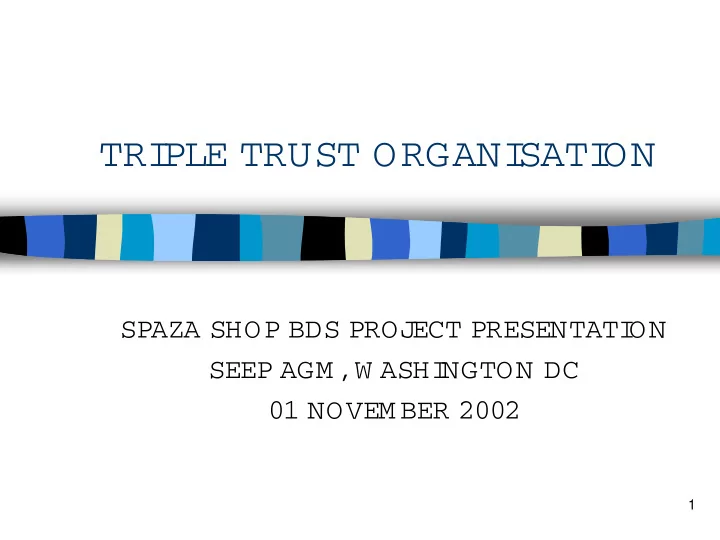

TRI PLE TRUST ORGANI SATI ON SPAZA SHOP BDS PROJ ECT PRESENTATI ON SEEP AGM , W ASHI NGTON DC 01 NOVEM BER 2002 1
The Triple Trust Organisation (TTO) � Based in Cape Town, South Africa � Started in 1988 � Mission – Poverty Alleviation through Enterprise Development � Goal is assisting people to be self employed � Historically a Training Service provider � Changed focus to become a MDA 2 Facilitator
Basis for change.. � Limitation of previous approach � External evaluations � Internal evaluations � Exposure to the BDS “best practice” 3
4 And this is why I am here…
TTO PLP project - Spaza Shop project 5
Definition of a Spaza Shop � Spaza � Hidden, quasi, makeshift, house shop � Spaza shop � An informal shop operating from the owner’s premises, inside or in the backyard, or in containers � Largely selling convenience goods, bread, paraffin, milk, etc. � Seen as a means of survival by many 6
Why the Spaza shop market � Spaza shops are the domain of the poor � Market with potential for efficiency and growth and impact � Spaza shops interface directly with the poor on a daily basis � It is a billion Rand industry (R1.02b) � The potential for the model to be replicated elsewhere in the country 7
Retail industry market share R 16,000 R 14,000 R 12,000 R 10,000 R 8,000 R 14,890 R 6,000 R 12,000 R 4,000 R 2,000 R 1,200 R 810 R 650 R 0 Total Rtlrs W/F HKrs Spaza trd 8
Project objective � To improve the efficiency of Spaza shops � To stimulate the Spaza shop market for BDS � To develop the BDS market for Spaza shop specialist service providers � To stimulate economic activity resulting in poverty alleviation 9
TTO’s project approach Project divided into 3 phases: Phase 1 � Commissioning of a Desk-top research Phase 2 � Commissioning of a study of the Spaza shop market Phase 3 � Intervention design and implementation 10
Challenges in Phase 1and 2 � Deciding on what appropriate research tools and methodologies to use � How do we find BDS in weak markets � The limited documented BDS information on the Spaza market 11
Progress to date Phase 1 of the project completed � � Survey of 300 Spaza shop owners � 6 Focus Group Discussions � Survey of 300 Spaza shop customers � Documented Research report � 12 key findings � Picture of the Spaza shop market 12
What did we find? BDS markets for Spaza owners Spaza shop market � Most Spaza shop owners •It’s a US102m market did not receive any per annum formal support to •The customers are start their businesses mainly low-income � Most Spaza owners earners don’t know of any organisation that � 57% percent of Spaza offers business owners would consider support registering their � Most Spaza shops businesses received informal •The common goods sold support from various are bread, paraffin and sources There are major matches problems/challenges � Spaza shops don’t get that Spaza owners have any preferential to deal with treatment from in their businesses suppliers 13
Challenges/problems … Problem Possible Insufficient and s BDS Links to suppliers limited range of Links to credit stock Transport services Transport related Organizing for group problems transport Links to storage Storage related facilities problems Setting up local storage points Pest control services Environmental Access to better problems storage containers Security services Access to better Theft security devices 14
Spaza shop supply and distribution channel Classification RETAIL DISTRIBUTION WHOLESALE MANUFACTURES 15
What we needed to know but didn’t ask… � Total amount spent on a basket of goods by brand and by source � Customer purchasing behavior patterns /habits � Understanding the diverse mix of Spaza shops � Understanding the variety of supply and distribution chains 16
What have we learnt… � The value of the research tool and its limitations � There are still gaps in our understanding of the market � There are questions we should have asked but didn’t � The importance of understanding the market before intervening � Where to look for information and how to find it � The importance of managing the research project very tightly 17
What are we to do next… � Address the priority gaps in our knowledge of the Spaza market � Understand the BDS market in the Spaza shop market � Understand the different product supply and distribution channels 18
Challenges in Phase 3 How handled Challenges The Spaza shop definition Expanded the definition to not inclusive of entire include all Spaza shops market Most BDS in Spaza shops Designed the questions embedded, informal or differently to uncover non-existent “hidden” BDS Use the most suitable Creatively use a mix of market assessment tools available tools using the to uncover hidden BDS “problem/solution” approach The ability to quantify Use Product concept testing BDS consumption in a and Price sensitivity as weak market part of problem/solution approach To find the most Using the experience and efficient way of knowledge gained and reaching adapting research tools to implementation phase suit our needs 19
W hat do w e do i f w e f i nd … If we We could… Work with suppliers to find… BDS mainly embedded leverage BDS in the range and informal of products on sale to Spaza owners Conduct awareness raising Low awareness and campaign among Spaza understanding of owners BDS No suppliers for Develop potential BDS some suppliers to provide that services/commercial specific service BDS for lager Assist BDS suppliers to Spaza owners cannot develop innovative pay up front payment options Design appropriate Suppliers reluctant distribution and payment to get into the mechanisms to remove 20 Spaza shop market barriers
Recommend
More recommend